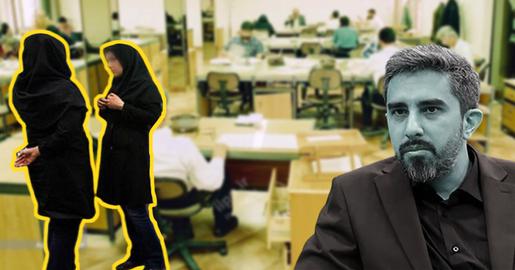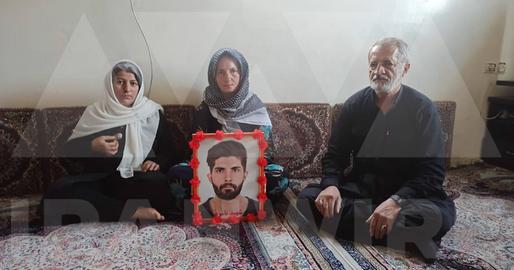Last week, the Geneva-based United Nations Human Rights Council heard the first oral update of a fact-finding mission it had set up to investigate human rights violations in Iran.
Apart from arguments between the representatives of member states, the session featured speeches by representatives of several Iranian non-government organizations that were widely overlooked.
These organizations are linked to the Iranian government and supported by the security institutions of the Islamic Republic.
While the participation of Iranian non-governmental organizations in meetings of the UN's top human rights body is not unprecedented, it is important to understand their dual roles as both non-governmental and security-affiliated entities.
This phenomenon where security organizations disguise themselves as human rights advocates appears to be unique to the Islamic Republic.
The Islamic Republic selects a group of non-governmental organizations to attend the Geneva meetings, presenting them as representatives of civil society engaged in human rights.
This maneuver aims to curtail the speaking time allocated to representatives of organizations that are critical to the Islamic Republic, while cultivating an illusion of diversity among non-governmental associations.
While the names of some Iranian organizations present at the Geneva meetings offer some clues about their nature, uncovering the truth behind other groups requires further investigation and exploration.
Misleading the Council’s Meetings
After the July 5 meeting of the Human Rights Council on Iran, human rights activist Maryam Banihashmi took to Twitter to express her concerns.
She highlighted that three purported human rights organizations spoke in support of the Islamic Republic in Iran: the Organization for Defending Victims of Violence, the Maryam Ghasemi Education Charity and the Association for the Support of Social Victims.
Both the Organization for Defending Victims of Violence and the Association for the Support of Social Victims had participated in previous council meetings in Geneva.
Their presence serves as an implicit endorsement of the Islamic Republic's claims.
Last autumn, lawyer Saeed Dehghan tweeted a series of messages on the eve of an emergency meeting of the Human Rights Council.
He questioned the motives of associations like the Organization for Defending Victims of Violence and the Association for the Support of Social Victims, which were scheduled to address at the meeting.
He raised the possibility that these organizations’ aim could be either defending the Islamic Republic's agenda or “attempting to mislead the focus of the discussion."
NGOs Founded by the Islamic Republic
The Organization for Defending Victims of Violence is widely known among human rights activists.
Hossein Raisi, a jurist and human rights lawyer, told IranWire that the Ministry of Intelligence established this group with the assistance of a former political prisoner.
Raisi explained that Saeed Nouri Neshat, a former political prisoner who was sentenced to death, was later released from prison on the condition that he repents and cooperates with the Ministry of Intelligence.
This Organization for Defending Victims of Violence was set up by the Ministry of Intelligence under the leadership of Alireza Taheri following the execution of political prisoners in the summer of 1988, according to Reza Moini, a human rights activist and former director of Reporters Without Borders.
The organization was formed despite objections from the families of executed political prisoners.
According to Moini, its objective is to "orchestrate violence and instill fear among those opposing executions and human rights violations in Iranian prisons." It achieves this by "misleading reports to international human rights organizations and institutions."
Moini added that, thanks to the support of countries backing the Islamic Republic, this organization has a monitoring role in the Human Rights Council.
The Organization for Defending Victims of Violence has maintained its activities for over three decades, receiving funding from various sources.
According to Moini, the organization received 1.2 million euros ($1.3 million) from the European Union in 2004 alone following the initiation of "constructive dialogues" between the bloc and the Islamic Republic.
Moini highlighted that this well-funded entity, which still retains observer status in the Human Rights Council, "distorts reports regarding human rights violations in Iran."
An NGO with Government Managers
There is limited information available regarding the history of the managers of the Association for the Support of Social Victims, but details provided in its establishment license and announcements in official newspapers reveal that government managers are directly involved in the organization’s running.
The 2018 establishment license mentions Saeed Sattari as the chairman of its board of directors. He is a former director of the Imam Khomeini Relief Committee, a financially well-endowed government institution.
Board members also include Ali Hemati-Vala, who previously was the director of the government-owned Iran Insurance Company.
Iranian news websites have reported that Hemati-Vala held positions in different ministries and was affiliated with the paramilitary Basij force.
The board of directors of the Association for the Support of Social Victims also includes Alireza Taheri, who previously headed the Organization for Defending Victims of Violence. In this capacity, he has spoken in support of the Palestinian Intifada.
His statements have been published by government news agencies and covered by the Fars news agency, which is affiliated with the Islamic Revolutionary Guard Corps (IRGC).
These organizations bear the names of non-governmental associations, but their most important members are former government officials and members of security bodies such as the Ministry of Intelligence.
Organizations established by such people with the support of the Islamic Republic present themselves as representatives of civil society, but they actually support the government's actions.
According to Raisi, the human rights lawyer, these organizations are deceptive. They do not defend Iran's civil society or the rights of oppressed protesters. They remain silent about the imprisoned and persecuted lawyers, as well as the killing of children during the protests. Instead, they serve as mouthpieces for the Islamic Republic’s intelligence agencies and act as infiltrators in the Human Rights Council on behalf of the Iranian government.
This is an issue that the United Nations and European governments are likely unaware of.






























comments